#Alexander Technique For Singing
Text
Alexander Technique New York
betterATbeing / Alexander Technique is dedicated to helping you develop constructive, conscious control of yourself, reducing unnecessary tension, and with it pain and discomfort. You can put your AT skills to use at any moment of the day to improve your own general functioning and performance, and enhance your experience of upright posture.

And because your mind and body are one continuum, it's not just your body that will benefit. You will improve how you interact with yourself and the world around you. To help you do that is my mission at betterATbeing.
Elizabeth Hurwitt
Get More Info : Alexander Technique Lessons
Website : https://betteratbeing.com/
Contact Us : Alexander Technique Lessons In Manhattan NYC
#Alexander technique Teacher in Manhattan NY#Healthy Aging with Alexander technique#Alexander Technique and Anxiety#Alexander Technique Classes Nyc#Alexander Technique For Singing
0 notes
Text
Day 2 Highlanders 7 con 20 July 2024 at the Hilton Metropole Hotel, Birmingham
Fan Meet with Richard:
If he's a betting man there will be Rebus 2 (with a wink)
Hasn't read more than 4.5 books (of OL) couldn't get through the Gathering in Fiery Cross
Everyone's really sad about it ending
Doesn't like the stickers chosen for the Rebus books but the author did so he was outvoted

Charles & David Q&A
As part of training for the roles, they were taught them how to stand and sit using the "Alexander Technique"
Demonstrating the "Alexander Technique" of how to stand up straight 18th-century style 👇
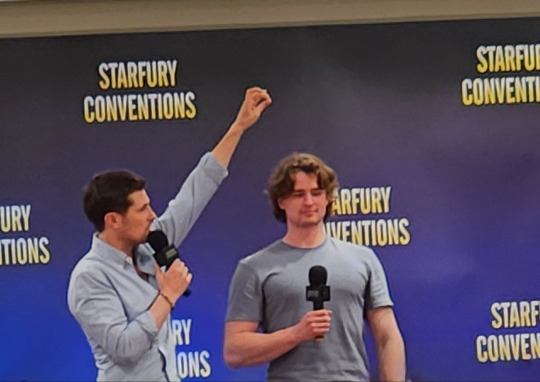
Question: if you could play another character who would it be: David - BJR; Charles - didn't know - fusion of LJG and Jamie
What won't you miss after OL ends - David travel; Charles didn't answer the question but said he'll miss his friends in Glasgow
Who would you go to a convention to see - Charles Eddie Vedder & Robin Kimmerer (author); David couldn't name anyone
Richard, Charles and Jamie Roy play Magic the Gathering (red: a card game) together almost every day when not working
When asked about a LJG series, David said if people want it he'd be up for it and people need to speak up about it

David and Charles singing O Canada 👍

Charles can walk on his hands - went back and forth 3x
Richard & Sophie Q&A
What song would describe your relationship on the show: Sophie - Lover (Richard joked Tolerater)
What role would you like to play: Sophie - Black Swan; Richard - Wolverine or Iron Man
Richard & Sam made different animal noises each take during the birthing scene
Hardest scene they had to film: Sophie - physically the ones with the horses; Richard - one where Brianna tells Roger Jemmy might not be his
If you could take a character ahead in time to see something - Sophie BJR to see Frank; Richard Jamie Fraser into the modern world - Richard loves Sam's reactions to modern things
What are you binge watching? Sophie - The Bear; Richard - Queen of the South and BBT
Sophie spoiler: Joey and I were in a tent (Richard adds "in the 80s")
Who would you go to a convention to see? Richard - BBT, Peaky Blinders: Sophie - Friends
They don't really get recognized in the UK but yes in the US "people in England don't really watch Outlander" (Sophie) - when they started in S2/3 it wasn't really "present", especially in Scotland.
Taken anything from set? Sophie very tempted to take the pearls but hasn't taken anything yet; Richard not yet either (made a joke about the musket balls and Lallybroch in the 80s trying not to spoil anything)
What song represents your character - Sophie "Girl on Fire" because she powers through things

Ed Speleers & Steven Cree
Favourite role so far - Jack Crusher (Ed)
Cree - best part of Outlander is the conventions
Favourite scene was when Bonnet kidnaps Brianna and they explain how he became what he is
Ed read for LJG and they came back to him the next year with Bonnett
Cree auditioned for Dougal (who's the guy who raised $250K for a film then never made the film? - ouch!!). Then they cast Sam and had to make Dougal age appropriate
What era would you time travel to: Ed - 60s: Steven - his early 20s
Sam created MPC and whisky "unlike the guy who embezzled $250K" (ouch again!! Cree used the word "embezzled")
Cree to Sean - how does it feel to be a millionaire? Sean - pass me your phone I'll call Sam and ask him
Cree was offered roles in Bridgerton 1 & 2 and said no after he read the scripts
Cree went on for 5 minutes about how Claire brought Jamie back to life in Monsters & Heroes - it was hilarious
Seems that the 2 of them (Cree and Ed) go way back and are good friends (Ed said Cree was the most excited when he landed the star trek role. They wouldn't ever have crossed paths on OL. They know each other's families too.)
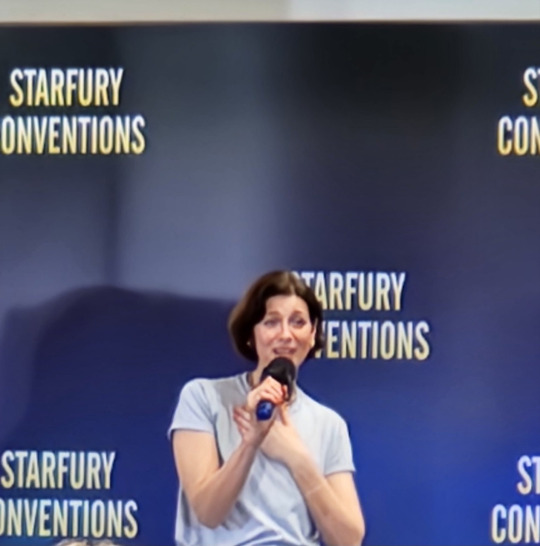
Caitriona
Funniest lines she couldn't get through - where she asks BPC if the bite was from a monkey and when Ian offers to go looking for Jamie and Claire says "but you don't have a leg"
Prefers to be called Caitriona
They talked about the ending of the books and someone yelled "Sam knows" then she said Sam THINKS he knows
Will be odd knowing they're not going back to Scotland when they finish filming. Couldn't say if they're staying but her husband is from Scotland and her in-laws live there so they will be there in some capacity
Costumes in S8 are her favourite since S2 Paris
Thanked everyone and said how much doing the show has meant to her
Asked if she and Tony share the same musical taste. She thought they said Sam and Steve said "no, your real husband" (she does with Tony, "definitely not" with Sam)
To prepare for Claire & Frank since they had a history, she and Tobias wrote each other letters. Tobias would redact his because he was in MI6. They didn't do anything to prepare for Claire & BJR because she didn't know him
During the rapid-fire someone asked "Sam's whisky or Graham's bourbon". She said Sam's whisky but hasn't tried the bourbon (she doesn't really like bourbon it's too sweet)
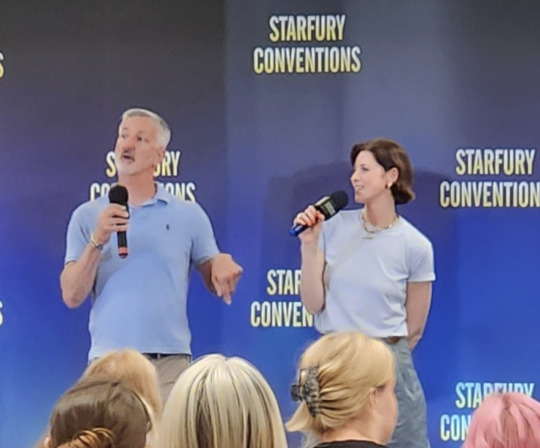
All credits to my reporter at the con (who chose to remain anonymous), including the pics.
93 notes
·
View notes
Text
It was @local-pr1nter who planted the Theatre Kid Mondo Owada idea into my head
Anyway
Here's the character list for who's who in my Danganronpa x Hamilton musical AU thing
Hamiliton Musical of 78' AU
Alexander Hamilton - Kiyotaka Ishimaru
He wasn't going to audition at first since he's never watched Hamilton before, but after a mandatory movie night watch with the entire class so they could 'study' the musical, he decided to try out for Hamilton himself
Taka absolutely loves Hamilton's passion and drive throughout the musical. He doesn't like the occasional cursing (and actively despises the affairs, both emotional with Angelica and physical with Maria), but he tries to look past it because it's all just an act afterall. He wouldn't actually curse if he were picked for the part (and definitely would not cheat on any future love interests)
He studies Hamilton HARD. Just as hard as the homework and topics that are discussed in class. He watched the entire musical 6 times over just to make sure he knew everyone's lines, moves, and personality. It doesn't matter that he was only going to be playing Alexander Hamilton, he still needs to know everyone else's lines too
Sayaka is his biggest hype man when he was practicing his lyrics before the rehearsal. Did he stumble over a line? That's ok, practice it a couple of times with me then try again! Can't hit a particular high note? Try this method she learned during a routine practice she was doing with her bandmates! Nervous before the audition? Look to the side of the stage, she'll be right there smiling and silently singing with you!
Hina is also like that, but with the dancing parts. Need advice for singing and dancing at once without getting tired quickly? She's got him, here's a technique she learned from swimming competitions!
Don't get me started on how loud they (and Mondo) screamed when Taka got the lead role. You would've thought there was a fire, or someone was attacking the school
He's still not over the cursing thing, but he'll manage! Somehow...
Aaron Burr - Mondo Owada
You thought he screamed loud for Taka? Wait until you hear what he did when he found out about his own role
He cried. Very hard.
It was almost scary how expessive he was after finding out he was gonna play THE Aaron Burr
"KYOUDAI! TAKA! KIYO! OH MY FUCKING GOD! TAKA! TAKA! TAKA TAKA TAKA TAKA! WHERE'S CHI? OH MY GOD! I GOT TELL CHI TOO! OH MY GOD!"
This man's happiness could not be contained
He practiced his ass off though so he definitely deserved his role. He was right there with Taka for the 6 viewings (plus the movie night viewing) of Hamilton
After just watching the musical, he started practicing singing. Considering he already knew the musical like the back of his bike before this, it didn't take much practicing to get every single line down for... Hercules Muligan.
That's right! He auditioned for Mulligan! Not Burr.
He definitely didn't think he was good enough to play the Narrator of the musical so the supporting friend of the MC will have to do.
He chose Mulligan mostly because of the man's lines. He sings in, like, 3 songs and most of the lines were about fighting, having sex, getting drunk, or being a spy. Cool ass guy with a cool ass voice. Right up Mondo's alley
The dancing was pretty simply to figure out too since it was mostly background choreography that he already memorized when he was 13. When he was back at home with Daiya, belting out the lyrics and dancing stupidly in the middle of the living room
After the wave of initial excitement, he realizes the responsibility that comes with being the narrator and the MAIN FREAKING ANTAGONIST AND HAVING TO 'KILL' HIS KYOUDAI OH GOD HOW IS HE GONNA DO THING?? BURR HAS LIKE 3 SOLOS AND A 2 WHOLE DUETS WITH HAMILTON AND SO MUCH STUPID DANCING AND-
Eliza Schuyler - Sayaka Maizono
No-one was surprised by this to be honest. Considering Eliza is the other lead besides Aaron Burr and Alexander Hamilton, it would make sense to choose someone who knows exactly how to carry the show when needed
Sayaka practiced pretty hard so she could be Eliza. No offense to the other girls, but she was practically born to be the main Schuyler sister! She's the best at singing and acting since she already has the experience so all she really had to focus on is practicing the lines (and Jesus does Eliza have a lot)
Of course, she celebrated with her bandmates after breaking the news to them. Not everyone in the group knows Hamilton that well, but they still had some fun having a karaoke party and singing the songs
She did have to plead with her manager to get the month and a half off of concerts to go to the practices. It took a lot of compromising (along with some promises that her fans would surely pay to come and see her), but eventually, the crabby old man agreed on the condition that she does some in-between photoshoots to make up for her otherwise radio silence towards her fans
Sayaka immediately began practicing her lines with Taka after finding out about her role. It's a little awkward to pretend to be in love with him, but they end up laughing about it throughout the rehearsal whenever they have to be affectionate towards each other, so that helps a bit
Angelica Schuyler - Aoi Asahina
Hina decided her role through the process of elimination. She doesn't want to be Eliza since she knows Sayaka is going for that role (and she would KILL as the Female Lead!). She doesn't want to be Maria or Peggy since there's only 1 song that they sing in, and she wants to dance and sing as much as possible! (These strong lungs and athletic limbs are made just for that, and they will NOT be going to waste!) Angelica is perfect! She's in a couple songs and is one of the main-side characters, she also has a whole solo where she gets to sing as loudly as possible about two of her friends! The context of the song might not be positive, but when has negativity ever stopped Hina?
She joins in on the practice sessions that Taka and Sayaka hold and joins in on one of the re-watches with Taka and Mondo
She, of course, has one on one sessions with Sayaka to improve her vocal cords. Going from loudly screaming the lines to passionately singing the lyrics
She practiced her choreography with Taka and Sakura, she asked Chihiro to join as well, but they ended up denying while poorly hiding a giggle
They're hiding something...
Oh well! Hina loves secrets so she'll just wait and find out with everyone else!
It doesn't really have to be clarified that she celebrated when she got the part! She was so so so so so excited to be Angelica!! Yayayay! Not only does this mean that she gets to sing and dance with her friends, but she'll also get to brag to her family about a fun new skill she learned! Or maybe she should keep it a secret until the big day? Oh, she doesn't know, she might just explode from the excitement!
She put all her excitement into the swim competition that she had a couple days later, and it won her first place! Yay!
Peggy Schuyler - Kyoko Kirigiri
Kyoko definitely wasn't planning on auditioning for any part. She'd much rather be on the sidelines with Toko
That plan changed quickly when Makoto wouldn't shut up about her being someone- ANYONE- so he wouldn't have to be alone in his small part (If he even got the part, his luck is kind of wonky sometimes)
She finally lamented and auditioned for Peggy. No practice at all, just went for it.
She was present for one of the watch throughs and watched the musical again on her own. The first watch was used to analyze how the characters act and interact with each other, the second was to analyze the plot and movements of the characters. She deduced that Peggy has the second least number of lines of any female main-ish character, (The first being Maria Reynolds and there is no way she is 'seducing' Taka on stage in front of people she most likely knows.) her movements aren't terribly complicated either and whenever Peggy is on stage, she's overshadowed by others, so no-one really pays attention to her. That role is perfect.
Kyoko simply smiled when she read the casting list and saw that she received the role of Peggy. Not only would this make Makoto less nervous, but also practicing for the musical wouldn't take up any time because Peggy is only present in 4 songs and speak briefly in 2.
She has cases to work on and she'd rather not let practicing get in the way of that
George Washington - Sakura Oogami
This may seem like a weird decision, but Hina and Taka thought it was a great idea that someone as stoic and wise as Sakura to play someone as respectable (and tall) as George Washington
It didn't take much convincing as she holds respects for him (and might've been a little intrigued in being in the musical)
It did take a bit of practicing since Sakura's way of talking is more slow-paced while Washington's lines are fast-paced
She is just as resilient in training her mental muscles as her physical muscles though, so the practice is welcomed with honor
All the practice definitely pays off as she finds her name 8th down on the cast list
A smile and a nod are the reaction that the stoic Oogami gave at this revelation... Then a gasp followed as Hina also read the list and basically tackled her from behind in excitement
Hina then went on and on about how amazing Sakura was going to look in Washington's waistcoat and trousers and how amazing she was going to sound because Washington's voice is amazing, and Sakura's voice is amazing and Hina loves all of the parts where Washington sings and now it's going to be even better because she'll get to listen to her girlfriend sing and-
Sakura was not let go of for another 4 hours, but she did not mind one bit
If she wasn't already excited for practice, then she definitely would be now with Hina's bouncing, bubbly excitement radiating all over the place
Thomas Jefferson/Marquis De Lafayette - Yasuhiro Hagakure
Gonna be so honest, I originally only picked this because of Hiro looks
And I'm going to go on a whim here and say that the judges (Who I'm going to say now were teachers like Chisa and maybe some eager volunteers from V2 and V3) at the audition also took Hiro's appearances compared to Lafayette and Jefferson in to account when casting people
Hiro did have some really good accent skills, probably from having to hide his voices whenever someone he scammed bumps into him
He's pretty good at fast talking too, probably also from him having to think of quick excuses on the fly for when he also bumps into someone he's scammed
Both of those qualities are needed to be Lafayette along with being silly and everyone knows Hiro is like the goofiest goober around when he needs to be
He's also witty, engaging, and very sarcastic when needed which are all the qualities needed to be Jefferson
Hiro had both characters down, he loved both of them, but he couldn't decide which one to do. He tried asking he crystal ball, but that just 'told' him that he would vibe as either. So, he consulted the cards, who also told him that he'd be fine as either
He auditioned as both Lafayette and Jefferson since that would amplify his chances of getting at least one of them. He sung a bit of Battle of Yorktown for Lafayette and Cabinet Battle #1 for Jefferson
The audition judges couldn't decide which they liked best so they decided he would follow in Daveed Diggs' footsteps and give him both roles to play
He looked at the cast list, he got there after everyone else with Leon because he had detention, and cheered, attempting to fist bump Leon, but Leon seemed upset. He let it go and went to tell Taka instead
He knew he would get at least one of the roles! Afterall, it was in the cards!
John Laurens/James Reynolds - Leon Kuwata
This man went straight for Alexander Hamilton with absolutely no practice
Well, that's not completely true. He practiced a little bit in the shower and sung Hamilton's parts in Helpless with Sayaka one time
He actually did pretty good despite the very minimum amount of practice
He stumbled on a couple words, he auditioned with My Shot, but ultimately made up for it with his dancing and charisma towards the judges
That's most likely the reason why they gave Leon the part of John Laurens. Laurens is Hamilton's bestie up until his death, he doesn't have too many wordy lines, and he's mainly there to hype up the crowd/his friends. He's perfect for Laurens!
Which is so not perfect for Leon since he's gonna have to watch as whoever gets Hamilton sweeps Sayaka off her feet while he sits back and literally cheers him on!
He goes back to the judges and tells the main judge, and the only one he can really find in this big, old school, Chisa (as nicely as he can) that he doesn't want to be Laurens. He uses the excuse that he feels as though he should be in more of the musical. Chisa agrees and tells him she'll see what she can do!
Cool! Now all he has to do is go serve his detention (Which he may or may not have gotten for racing toy cars in the hall with Hiro and making someone trip) and come back later to see his name right next to Alexander Hamilton
...James Reynolds? Wasn't that the abusive husband? That's not what he meant by 'being more in the musical'! This guy only had like 2 lines and one's about calling his wife a whore!
Leon was left so much more upset than before; he didn't even notice Hiro trying to fist bump him or him leaving. He was seething when he realized that Mr. Hardass was taking his spot at woo-ing Sayaka, the exact same Hardass that gave him detention.
Now he had to pretend like he was really happy for Ishi-Ton and Say-Liza while also remember all these new stupid lines for not just Laurens, but also Reynolds
Hercules Mulligan/James Madison - Byakuya Togami
Literally only got these parts because of his deep voice
He did not audition for Mulligan or Madison, he auditioned for Aaron Burr. Why not Hamilton himself? He did not want to be seen as a protagonist; he sees himself as more suited to be the antagonist, and he did not want to have to fake not 1, not 2, but 3 romances with women he did not have a lick of feelings for.
Aaron Burr is level-headed until he started acting like that fool Hamilton, he thinks his plans through to a detrimental level, and he only mentions a love interest for a couple minutes before focusing on his life plans again. He was the perfect candidate for Togami to stand in as.
He did not practice any dancing but did multiple different private practices for his vocals. He auditioned with Wait for it as it did not require dancing so he could focus on his lines for the pitiful judges that watched him. He did perfectly and was left to wait for the confirmation.
He wanted to wait for all the idiots to clear away from the cast papers, but an unexpected squeal from the overgrown, meathead who was raving about getting his part made him push everyone else out of the way to see if what the big baby of a biker was saying was true. It couldn't be true; Aaron Burr was his part.
...There had to be some kind of mistake! He scanned over that sheet 3 times to find that the dreaded papers were not lying. He was not Aaron Burr; he was Hercules Mulligan and James Madison. Madison he could respect, the man is sophisticated and responsible both in history and in the musical, but Mulligan is a short, angry brute! That is the person suited for that currently over-emotional biker, not Aaron Burr!
He turned to tell that stupid biker that just as the meathead was rushing off to find the little tech student.
Damn it all.
He went to instead lay out his fury with Chisa, the main judge, in a not so polite way. It didn't seem to affect her though. She simply said that she could give those parts to someone else, and he could work in the back with Fukawa...
He dialed the number of his private vocalist to inform them of the change in lines he would have to practice.
King George - Celestia Ludenburg
She too practiced in private.
Of course she was going to go straight for the King, who else would befit her?
It didn't take much singing to convince the judges. Her voice is powerful, condescending, and sarcastic. Perfect for King George!
She will not be spitting like he famously does, but besides that, she already has his part in the bag.
She didn't have to go check the list to know she got her part, but it was worth getting all dressed up to see Togami's hissy fit at his cast reveal
Maria Reynolds - Junko Enoshima
The cheating, the manipulation, the groveling, the despair of a broken marriage caused by her, how could she pass that all up?
The part wasn't hard at all to get down, she was already basically a natural actor.
She practiced only for a stupid older sister's benefit. Poor Mukuro was so nervous about her small little part that she had to practice her chosen part over 30 times (It was definitely because Mukuro was nervous and not because Junko kept laughing and pointing out every little mistake she made)
Her part also came with the added bonus of getting to feel up Mr. Stick-in-his-ass without getting detention. In fact, she might be praised for the added realism
She didn't check the casting roster until really late at night, unfortunately missing the RichMan™'s breakdown, to avoid everyone else for her poor sister's sake (MukMuk is such a big baby, she swears)
She got the part (Yay) and so did her sister (Boo)
George Eacker - Mukuro Ikusaba
She didn't have that many lines, but she just kept messing up during practice for some reason
Luckily, she got them right for the audition (or she hopes she did, Junko didn't say anything so she must have done good)
She wasn't going to audition for any part, just work with Fukawa in the back, but then Junko said she'd be perfect for the part of the murderer of Philip Hamilton and asked her to try out for it
She couldn't deny her little sister, could she?
It was nerve-wracking, but the list had finally been posted so regardless of her nervous-ness, she would have her answer once she went to check the papers.
Junko had to end up dragging her to the papers late at night because she couldn't bring herself to go
She got the part, yay.
Charles Lee - Makoto Naegi
He wanted to be in the musical to support his fellow classmates while also not having to memorize many lines as he might end up forgetting them out of nervousness
Charles Lee, George Eacker, and Samuel Seabury were all good choices. Samuel would be hard though, because he and Taka would have to be singing over each other and he might not be able to say his lines at the same time as him. Especially because of how loud and intimidating Taka can be
He decided to eliminate him and focus on the other 2 options. They both had relatively short parts so auditioning with both of their songs wasn't met with any restraint from the judges
He figured, with his luck, he had to get one of the parts and if he didn't, because that was still definitely a possibility, then he could help Toko with backstage work full time
Luckily, he got Charles Lee. Unluckily, Byakuya decided to take his anger out on him by ranting about 'The Giant Oaf' as he referred to Mondo for almost an entire hour
That's ok though, Makoto is always up to support a 'friend' in times of distress!
Samuel Seabury - Hifumi Yamada
He originally was just going to work backstage with Fukawa Toko-dono but at the prospect that his Mistress is going to be centered as royalty and there is a commoner whose sole role is encouraging the Town People to worship her, he immediately started practicing for the part of Seabury
He was pretty good, even putting on his Manly™️ Voice while auditioning
Because of his impeccable performance, (and the fact that no-one else auditioned for that part) he was almost immediately given the role
Mistress Ludenburg even praised him for his role! (Then ordered him to make her some tea to celebrate)
That's all the main characters sorted I think so next post will be all about how each song and the practices for that particular song went. As expected for the class of 78, there will be lots of shenanigans (and maybe even some fanart to go with it if I can figure out how to draw some of these characters)
○
○
○
○
○
Hold on, there's someone I have forgotten!
Philip Hamilton - Chihiro Fujisaki
Chihiro practiced with Sayaka privately, which was super awkward at first, but they eventually got over it
They wanted to surprise everyone by being in the musical! They know it will be really hard because they'll have to preform in front of everyone in a pretty major role, but that's what the practice is for. They've been getting physically stronger with Mondo, so it's time to up their emotion and mental strength (along with their vocal strength because they have a pretty small voice)
They were really nervous about preforming just in front of the judges, but that's ok because they did it and that's all that matters
They didn't even get a chance to look at the casting roster before Mondo came barreling into them announcing his role. Getting to see the unabridged happiness and excitement from Mondo almost made up for being crushed in a back breaking hug.
After the initial excitement, they then had to listen to his anxieties about all the lines and dance movements he's gonna have to remember before joking that they wouldn't have to do that themselves since they didn't audition for anything. Mondo will not admit that he stumbled to keep up as Chihiro pulled him down the hall (not running, just speed walking as they did pass Taka on the way) back to the casting papers
It took a minute as they specifically requested that their name went on the second paper and not the first so the likelihood of anyone finding their name on accident was low, but they sure did find it... and they were almost immediately put into another crushing hug. They may have gotten stronger and used to Mondo's physical affections, but the bear hugs are something they don't think they'll ever get used to
They leave off telling everyone else, they'll figure it out during practices
Alright, that's everyone! Any other minor roles that weren't assigned to anyone is picked up by other Ultimates that aren't in the 78 class (maybe some of the class of 77 helped) like the background dancers or the prop and set movers. Toko doesn't get a role, not because I don't like her because I absolutely do, but because:
1. I could not find a role that fit her comfortable
2. Realistically, she would not and could not perform in front of potentially 100s of people (Most of whom are made up of the classmates' family and friends, along with Sayaka's fans who came just for Sayaka)
3. She would not want to risk Syo coming out in front of hundreds of people. She would rather have her come out while backstage because then someone could notice and get her away from the stage area more subtly and without worry
She's content with having to pull the curtains or just motioning for props to be sent out to the stage.
This entire performance is going to be put on in a sort of hall, think of a graduation ceremony kind of hall. Despite the huge school and its amenities, they could not fit all the props, characters, and costumes along with 100+ people anywhere in the school comfortably. The school funds the renting of this hall though since this is for a festival. The festival will be happening at and around the school where some students will also be selling tickets for the musical and then there will be an announcement, signaling that the musical will start in an hour. All guests will then move to the hall, get their tickets taken, and take their seats.
#danganronpa#danganronpa trigger happy havoc#kiyotaka ishimaru#mondo oowada#mondo owada#sayaka maizono#dr1 maizono#danganronpa hamilton#hamilton musical#Hamiliton Musical of 78' AU#trigger happy havoc#class of 78#aoi asahina#sakura oogami#sakura ogami#yasuhiro hagakure#leon kuwata#byakuya togami#Can you guys tell I don't like Byakuya?#celestia ludenberg#chihiro fujisaki#Can you guys tell I love Theater Boy Mondo?#Daiya Owada Lives BTW#That will be prevalent later#kyoko kirigiri#junko enoshima#hifumi yamada#makoto naegi#mukuro ikusaba#I hope I characterise them well because I'm kinda bad at that
39 notes
·
View notes
Text

Alexander Knaifel
Russian composer whose sparse musical landscapes create a spiritual ambience of meditative calm
Alexander Knaifel, who has died aged 80, did not set out to be a composer. As a student in the 1960s, he studied the cello with Mstislav Rostropovich until injury intervened. Then he redirected his energies towards composition, at a time when the Khrushchev thaw could accommodate the musical modernism of the Soviet Union’s second avant-garde period (the first having come in the years around the 1917 revolution).
But the cello retained a significant role in Knaifel’s output. Rostropovich went on to commission and premiere three religious works that reflected both Knaifel’s adoption of Russian Orthodox Christianity around 1970 and his conviction, which appealed to Rostropovich, that experience can be heightened by performers thinking – “silently intoning” – a text as they playe the music.
Chapter Eight – Canticum Canticorum (The Song of Songs, 1993), a work “for church, choirs and cello”, unfolds slowly over the course of an hour. With three a cappella choirs adopting a cross formation in Washington National Cathedral in the US, the premiere was recorded for the Teldec label and released under the title Make Me Drunk With Your Kisses (1995).
The Fiftieth Psalm (1995) is for solo cello. Psalm 50 in the Orthodox numbering is Psalm 51 in the west: Miserere/Have Mercy. With his concern for “playing as if singing”, Knaifel felt that “only Rostropovich could articulate this text”, and his recording of it was released on the ECM label in 2005.
Blazhenstva (1996) is a meditation on the Beatitudes, Jesus Christ’s sermon on the mount. Rostropovich’s last cello student, Ivan Monighetti, later recorded it with Knaifel’s wife, Tatiana Melentieva, as the soprano soloist with the State Hermitage Orchestra from St Petersburg for another ECM release.
That 2008 recording also features Monighetti playing a piece in the modernist style that preceded Knaifel’s more ethereal approach, his Lamento for Solo Cello (1967, revised 1986). Built upon serialist tone rows, and with a striking approach to timbre and performance techniques, it is also highly expressive.
From the same period came his Monody for Female Voice (1968), again written in a modernist style, with modal phrases juxtaposed with glissandi descending in quarter-tones and wide intervals. Premiered by Melentieva, it was written with her crystal-clear tone and extensive vocal range in mind.
Knaifel first made his mark with the opera The Canterville Ghost, given a semi-staged student production in 1966, at the end of his studies at the Leningrad Conservatory. Based upon the humorous ghost story by Oscar Wilde, it was taken up by the Kirov Orchestra under Alexander Gauk in Leningrad in 1974 and the BBC Symphony Orchestra under Gennady Rozhdestvensky in London in 1980. A 1990 recording with Michail Jurowski directing the Moscow Forum Theatre, reissued on Brilliant Classics in 2012, brings out the young composer’s confident delivery of musical humour and mastery of orchestration.
In Knaifel’s more ascetic and contemplative works, solo lines and single sustained pitches are spun out over long durations – sometimes over the course of two hours – almost to the point of stasis. In the more minimalist language of what he called his “quiet giants”, he was ahead, among Soviet composers, of either Giya Kancheli or Arvo Pärt, in presenting pared-down content that is rich in spiritual ambience. There is no obvious parallel to Knaifel’s music in the west, although it bears some similarity in style to that of the American composer Morton Feldman.
Of two large-scale works from the 1970s, Knaifel said: “In Jeanne, I discovered the number, in Nika, the word.” He reworked a Joan of Arc ballet into Jeanne, Passion for 13 Instrumental Groups (1978), a work of extreme asceticism drawing on the principle that the universe is built on numbers and proportions with rational and symbolic power, while Nika, 72 Fragments for 17 Performers on Bass Instruments (1974), was the first of his works to use unspoken texts.
Agnus Dei for Four Instrumentalists A Cappella (1985), with a characteristically paradoxical title, is powerful in impact given its sparse musical landscape and the sense of meditation that this creates. It utilises a wide range of literary examples, ranging from the liturgical to quotations from the diary of a young girl, Tanya Savicheva, who died during the siege of Leningrad.
These texts, printed in the score as well as in the audience’s programme notes, are never heard in performance, with the musicians being instructed to “think the text” as they play. Knaifel maintained that the word does not needed to be explicitly stated for the work’s spiritual intention to be understood.
His compositions of the 1990s and beyond increasingly displayed a religious aesthetic and an even more ascetic musical language. Texts both secular and sacred were present, but, in line with the Gnostic tradition, Knaifel asserted that “truth” must be hidden and revealed gradually to the listener in order for it to have validity.
This approach found its fullest and most original expression in In Air Clear and Unseen (1994), for texts by Fyodor Tyutchev, piano and string quartet, with its extremes of register, periods of silence, silent intonation, religious symbolism and virtuosic performance techniques. A recording by the pianist Oleg Malov and the Keller Quartet was released on ECM in 2002.
Knaifel’s opera Alice in Wonderland, premiered in Amsterdam in 2001 with a cast including the baritone Roderick Williams, has a libretto based upon Lewis Carroll’s narrative. But the text is rarely sung, instead being either mimed, or even in a few instances, coded visually, through coloured lights playing on a backdrop on stage.
Born in Tashkent, Uzbekistan, Alexander was the son of Russian-Jewish parents: his father, Aron Knaifel, a violinist, and his mother, Muza Shapiro, a music theory teacher, had been evacuated from Leningrad at the time of the siege. From the Leningrad Central Music School (1950-61) he went on to the Moscow Conservatory, where his cello studies under Rostropovich were ended by a nerve inflammation in his left hand. At the Leningrad Conservatory (1963-67) he studied composition with Boris Aparov, a student of Shostakovich.
In 1979, Knaifel was blacklisted by the Soviet authorities as one of the “Khrennikov Seven”, including Edison Denisov and Sofia Gubaidulina, following the premiere in Cologne of his improvised piece A Prima Vista (1972), attracting the ire of Tikhon Khrennikov, leader of the Union of Composers of the USSR.
Knaifel turned his attention to writing film scores, written in a more conventional idiom. There were 40 in all, including those written for his frequent collaborator, the Russian director Semyon Aranovich.
Working with the composer on preparing a number of written texts for publication led me to appreciate his childlike sense of wonder alongside his warmth and playful sense of humour. This sense of a child’s world was apparent in both the Alice opera and its predecessor, the surrealist song cycle A Silly Horse (1981), of which a recording by Melentieva and Malov was reissued on the Megadisc label in 1997.
Knaifel married Melentieva in 1965. She survives him, along with a daughter and a grandson.
🔔 Alexander Aronovich Knaifel, composer, born 28 November 1943; died 27 June 2024
Daily inspiration. Discover more photos at Just for Books…?
8 notes
·
View notes
Note
Ranking of all the actors who played each role in the last les mis cast then please
ok since literally one of you asked here goes:
Valjean
Chris Jacobsen
Honestly, this man's Valjean is just something else entirely. His portrayal just has so much thought behind every action and I truly appreciate a Valjean that is just a little bit fucked up because he did fully spend 19 years in prison. You need to listen to his Bring Him Home to appreciate just how perfect his voice is. Not just my favourite Valjean of this cast but one of my favourite Valjean's ever.
Joseph Anthony
Ok he fully got like 2 shows this entire contract but I saw one of them and was utterly amazed! He's only like 26ish but genuinely his acting was so great you'd never notice. Also it was very obvious that he started on the tour watching Dean Chisnall because his performance was very soft and nuanced like Dean's! Here's his Bring Him Home too if you're interested.
Luke McCall
Always had a lovely voice but didn't exactly do much acting in his pre-pandemic era, very wooden. However, he came from the Staged Concert a changed man. His finale is genuinely heartbreaking from start to finish, I have quite often found myself in tears. He could have ended up at no. 2 but his vocals have REALLY let him down these past few months. Here's one of my fave clips of him in his vocal prime doing The Confrontation opposite Richard Carson.
Jon Robyns
Look I love Jon, I really do...but his voice has just been in constant decline this year and I spend shows where he's on genuinely preparing myself for the inevitable cracks on all the big notes. His acting is really quite fantastic but god, until he takes some time to fix his vocals I honestly can't rank him any higher.
Javert
Richard Carson
I wasn't sure about him to begin with but the way he grew into the role as he got more chances to go on was truly my favourite thing this cast. A fantastic, old school, PROPER BARITONE, javert. He's so perfectly cold and callous and his suicide is this perfect, unhinged breakdown at FULL SPEED (also truly incredible technique that he can do those big hyperventilating breaths and sing at the same time)
Bradley Jaden
A truly extraordinary Javert on a good show, an incredibly below average one on a bad day. I think there was a point around June/July where he'd really found a perfect balance to his batshit suicide and coldness throughout the rest of the show. I also truly loved the way he embraced the valvert vibes.
Fantine
Kathy Peacock
INCREDIBLE. The vintage Fantine we deserved. God I loved her. Here's her I dreamed a dream from her debut.
Jessica Joslin
Another Fantine with a very classical musical theatre voice. I never really found her IDAD emotional enough though, like her acting was just never quite enough for me.
Ellie Anne Lowe
ANOTHER Fantine with a very classical musical theatre voice. Only saw her once pre-shutdown but loved every single second.
Chanice Alexander-Burnett
Look she was fine, a perfectly acceptable Fantine. I really never thought we got much from her acting wise though and I truly despised the riffs she sometimes did in IDAD.
Never sat Natalie Green but tbf she had literally one show and I'm sure I'll undoubtedly get a chance in the coming year!
Enjolras
Leo Miles
If you've followed me long enough you'll know I was for a long time a Leo hater. However, I do not regret this. He has genuinely really improved in this past year and I love that for him! He's always had a lovely voice but he was so wooden. Now his Enjolras is absolutely heartbreaking, him and Connor's Grantaire are literally so in love with each other. Also pls listen to this note.
Joseph Anthony
Just a really good Enjolras tbh.
Jordan Shaw
Honestly...just all over the fucking place. Everytime I think he's maybe improved he'll just make the most bizarre choices ever. Like I've honestly gotten used to his more contemporary voice but I just can't get used to his absolutely batshit portrayal. Sometimes it can be fun to watch Chris' jaw literally clenching when he's being particularly bad.
Also shoutout to Bradley who gave one of the best Enjolras' performance I've seen despite literally not knowing a single bit of the blocking. Him winging that new One Day More marching was iconic tbh.
Also shoutout to Will Richardson who was fairly good but also nothing particularly special.
Eponine
Mared Williams
One of the best Eponine's I've seen. A really interesting voice and such fantastic acting. The first time I've ever cried at A Little Fall of Rain. Here's her On My Own
Sha Dessi
For the first half of this year she was absolutely nailing it, her On My Own felt so intimate. Unfortunately seems to have had some serious vocal issues for the past few months that have really let her down which is such a shame!
Jessie Hart
To be honest she's still a fantastic Eponine. I'd definitely say the Eponine's have been the strongest all round, there's no a bad one! Her Eponine has an edge to her which I really enjoyed and her On My Own almost made me cry once.
Also shoutout to Jenna Innes who I won't rank here but was an absolutely beautiful Eponine that I would have probably ranked 1st if she'd been a permanent cast member!
Marius
Harry Apps
MY ABSOLUTE BELOVED FREAK OF A MARIUS. He's so weird and awkward and just a young guy in love, it's absolutely adorable. It makes his Empty Chairs such a heartbreaking contrast. His final one had me in actual proper tears.
Danny Colligan
Honestly, don't have that much to say. He was fine, just a run of the mill portrayal tbh, and his voice is a little thin for my liking.
Michael Kholwadia
Genuinely seemed like he'd just walked onstage for the first time and was winging it. His voice is nice enough but very wooden.
Cosette
Claire O'Leary
Honestly she's just number one cause at least she can hit the notes.
Charlie Burn
You know, she isn't the best vocally, but I do enjoy her acting, especially with Valjean in In My Life!
Phoebe Williams
Don't really like her voice and honestly didn't think she did much acting tbh.
I'm actually not gonna rank the Thenardiers because I didn't get to see Georgie or Matt! I've also seen pretty much every single possible combination of covers and swings for the smaller roles if you want to hear my rankings of any of those just drop me an ask specifying which!!
12 notes
·
View notes
Text

The joy of the Messiah's appearance abounds in the Church's liturgical services of the Winter Pascha. When the "Hail" of the angelic salutation is translated "Rejoice," as it often is in the church services since in Greek that is what it literally means, there is an even greater presence of the "good news of great joy" for the faithful, since they, together with the whole of creation, are greeted with this salutation again and again in the songs of the festal celebration.
Let creation exceedingly rejoice,
For the Creator fashions himself as a creature.
And He who was before all things now manifests Himself as God newly revealed.
Let the wise men go to meet Him with their gifts;
Let the shepherds clap their hands in faith at the wonder;
and let mortal men join the angels with rejoicing.
Be joyful, O earth!
Behold, Christ draws near to be born in Bethlehem.
Be glad, O sea!
And dance for joy, O company of prophets,
For today you behold the fulfillment of your words.
Rejoice, all you righteous!
Let the kings of the whole earth sing with rejoicing,
And let the nations be in exceeding joy!
Mountains, hills, and valleys,
Rivers, seas, and the whole of creation:
Magnify the Lord who now is born.
Rejoice, O Virgin,
The Theotokos who of the Holy Spirit
Has borne life into the world
For the salvation of all!
One of the most devastating accusations that can be made against Christians is that they have no joy. Joyless Christians are a contradiction in terms. People who are bitter, complaining, condemning, accusing, dissatisfied and depressed are certainly not Christians. They can only be people whose life is untouched by grace, people whose existence is confined to the suffocating limitations of "this world" whose "ruler" is the devil and whose "form... is passing away" (Jn 12:31; 1 Cor 7:31). They cannot possibly be those who belong to Christ and the kingdom of God. For Christians by definition have Christ's "joy fulfilled in themselves" (Jn 17:13). They are people whose joy, which no one can take away, is literally full and complete (Jn 15:11; 16:22, 24).
In his famous book For the Life of the World, Father Alexander Schmemann speaks about the joy of Christians. From its very beginning, he says,
Christianity has been the proclamation of joy, of the only possible joy on earth. It rendered impossible all the joy we usually think of as possible. But within this impossibility, at the very bottom of this darkness, it announced and conveyed a new all-embracing joy, and with this joy it transformed the End into a Beginning. Without the proclamation of this joy, Christianity is incomprehensible. It is only as joy that the Church was victorious in the world, and it lost the world when it lost that joy, and ceased to be a credible witness to it. Of all the accusations against Christians, the most terrible one was uttered by Nietzsche when he said that Christians had no joy.
Father Alexander goes on to say that before Christians can do anything else with all of their "programs and missions, projects and techniques," they "must recover the meaning of this great joy." he says that joy "is not something one can define or analyze. One enters into joy. 'Enter thou into the joy of thy Lord' (Mt 25:21)." And one enters into this joy, this exceeding great joy, he insists, only by entering into the liturgical, eucharistic life of the Church herself. Here, and only here, as in the celebration of the Nativity of Christ and His Epiphany in the world, can a person partake of that joyful reality for which the world itself was created in the beginning.
The above is an excerpt from The Winter Pascha, by Fr. Thomas Hopko
8 notes
·
View notes
Text
BUDDHA APP SAYS II VR VERSION : THE DEVINE AND THE DEVICE
2017, Music, performance, virtual reality, 240 min
Live sound: Alexander Sahm / Concept: allapopp / performance: allapopp, Alexander Sahm, Anja Arncken, Deike Schwarz, Dominik Keggenhoff, Max Barthel / room installation: Sabine Born / Unity VR: Dominik Keggenhoff
Buddha App Says is a research project inspired by references to digitally enabled and web distributed tools for spiritual development and mind enhancement sound techniques such as brainwave music.
Durational performance invites the spectator to visit the Techno-Spiritual Center for Technospirituality. With an aim of recruiting new members, the Center opens the doors to visitors. Audience is invited to participate rituals like Iphone Yoga, Selfie Exercise, Legend Reading sessions, joint singing or to listen to a preaching by Alla’s computer synthesized voice and Alex’ mind enhancing live music. Personally assisting Admins of the Center decide when a candidate is “ready”, after what they are invited to visit the The World of Techno-Spirits, accessible via VR Glasses. During the visit Superfoods are offered.
0 notes
Text
p.o.p. (psychology of perception) [Alien Stewardess]

Release date: February 01, 2024
Catalog no. zappak-008
[Tracklist]
[Disc 1]
celestial cabaret [09:55]
cosmic concierge [26:27]
intangible vibrations [30:41]
[Disc 2]
galactic grace [20:06]
transdimensional melodies [20:42]
Excerpt:
https://soundcloud.com/zappak/zappak-008-1
https://soundcloud.com/zappak/zappak-008-2
Cello: Nora Krahl
Electric bass: Hannes Strobl
French horn: Elena Kakaliagou
Piano: Reinhold Friedl
Recorded, mixed, and mastered by Hannes Strobl in 2023.
---
p.o.p. (psychology of perception) is the acronym of the Berliner group by Reinhold Friedl (piano), Elena Kakaliagou (French horn), Nora Krahl (cello), and Hannes Strobl (electric bass) stands for.
“Alien Stewardess”, their third album, remains true to the subject, focusing on perceptual psychology and kinetic memory. “Alien Stewardess” is building on and deepening the research topics of the earlier releases: repetition and difference, like tapestry and woven carpet: patterns of similarity, rhythmic twists and varied timbres ("Täbriz", Monotype Records / 2013), and the exploration of sound architecture and the Japanese art of flower arrangement, selectively gathered materials in ever-changing combinations on "Ikebana" (FMR / 2016).
“Alien Stewardess” concentrates on the question: What do the musicians' bodies know? Four individual musicians, each with his/her own sound and body memory, create a network of interferences and thus a multiplication of the sonic-kinetic perspectives: sensual, three-dimensional, organic. Let yourself be guided by the alien stewardess in and out of time and space! Enjoy the journey…
p.o.p.(psychology of perception/知覚心理学)はベルリン在住のReinhold Friedl(ピアノ)、Elena Kakaliagou(フレンチ・ホルン)、Nora Krahl(チェロ)、Hannes Strobl(エレクトリックベース)によるグループ。
彼らの3つ目の作品[Alien Stewardess]は彼らの主題に忠実であり続け、知覚心理学と運動記憶に着目し、これまで作品での研究トピックにもとづいて構成され、さらに深められている。タペストリーや織絨毯(類似性のパターン、リズミカルなひねり、そして多様な音色)のような反復と差異による[Täbriz] (Monotype Records / 2013)、そしてサウンド・アーキテクチャーと日本の華道芸術の探究(常に変化する組み合わせで選択的に収集された素材)による[Ikebana] (FMR / 2016)。
[Alien Stewardess]では以下の問いに着目している。それは、演奏家の身体は何を知っているのか、というもの。4名それぞれの演奏家自身のサウンドや身体記憶は干渉のネットワークを作成し、それによって官能的、三次元的、有機的な音の運動学的視点の掛け算をおこなうというもの。それでは宇宙人のスチュワーデスによるガイドに身をゆだねて、時間と空間の内外を行き交いましょう!素敵な旅をお楽しみください…。
---
p.o.p. (psychology of perception) members;
Reinhold Friedl

(Photo by Olya Gluschenko)
Reinhold Friedl, born 1964 in Badeo-Badeo, Germany, is an influential figure io experimental music, a pioneer of new physical sound qualities ranging from precise sensuality to noisy harshness: his Inside-Piano taught the instrument to sing, his internationally acclaimed ensemble zeitkratzer opened up new horizons for ensemble playing, from Xenakis to Lou Reed, from folk music to Stockhausen, not to mention young (non-academic) composers and numerous transdisciplinary collaborations including film projects. Reinhold Friedl's compositions go one better: orgies of sound for orchestra, noise choreographies for string quartet, recorded by Quatueur Diotima, extended techniques worthy of the name turning the solo piano into an orchestra.
Friedl studied mathematics, composition (Mario Bertoncini and Witold Szalonek) and piano (Renate Werner, Alan Marks, Alexander von Schlippenbach) and released more than hundred CDs and vinyls. He holds a PHD from Goldsmiths University London and got commissions from international festivals as Wiener Festwochen, BBC London, the French state, Berliner Festspiele, ZKM, etc. and published numerous articles and radio features on electronic music. Touring worldwide.
www.reinhold-friedl.de
Nora Krahl

Nora Krahl is literally all over the place: She lives in different parts of the country simultaneously, she plays cello, composes, improvises with electronics, with VR Glasses and motion tracking suits. And she also is a director for experimental contemporary opera. Her abundance of ideas forms the foundation for her art and improvisational music, characterized by multilayered textures and structures. Nora has performed throughout Europe, Middle East, Asia and in the USA with ensembles as Ensemble Resonanz, the Octopus, Reflexion K, Zeitkratzer or She She Pop. Nora premiered her pieces for music and theatre in Cloud City (NYC), Hamburger Bahnhof (Berlin) or Depot Gallery (Istanbul). Nora also loves Theater and worked as a cellist at Schauspielhaus Köln, Deutsches Schauspielhaus and Columbia University New York. She was awarded numerous scholarships and attended artist residencies in Istanbul, New York City and Basel. Ms. Krahl holds a German music diploma from the Folkwang University of the Arts and a Master io Opera directing from Hanns Eisler School of music Berlin.
norakrahl.de
Hannes Strobl

Hannes Strobl is a bassist, composer and sound artist based in Berlin.
An essential starting point of his music is the sonic potential of the electric bass guitar and the electric double bass. Hannes Strobl expands their characteristic repertoire of expression by using special playing techniques in combination with live electronics. In recent years, Strobl's interest in the instrument and his compositional work has increasingly focused on musical forms of expression against the background of urban sound space, as well as on installations whose starting point is the relationship between sound and architectural space Works io various audio and audiovisual fields, such as electronica, sound installations and music for video and performances.
hannesstrobl.de
Elena Kakaliagou
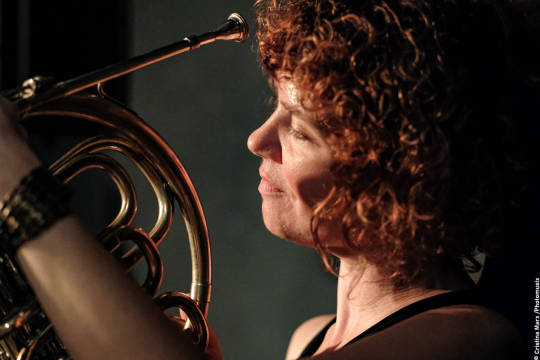
(Photo by Cristina Marx)
Elena Kakaliagou, born in 1979, is a Greek-Austrian French-horn player and performer living in Berlin. Αfter her studies io classical music io Greece, Austria and Finland, and inspired by new, folk and experimental music, Elena developed her own language on the French-horn; lyrical and mellow, angry as a wild animal or a stormy sea, calm as the wind or the soft rain. Elena can be heard on more than 20 musical albums, among others the onces of her duo Nabelóse, her trio Zinc & Copper, a solo, and plenty of collaborations of free, experimental, composed and new music.
She is an active member of the free improv scene of Berlin and plays with zeitkratzer and Stefan Schultze Large Ensemble, next to various new music ensembles. For infos about past and current collaborations, concerts, venues, festivals and stage performances of Elena, please visit her website to figure out more.
www.elenakakaliagou.com
【Review】
Vital Weekly:
p.o.p. (psychology of perception) is preferred in lowercase; I am not sure why you would write between brackets what p.o.p. stands for. Why not use one or the other but not both simultaneously? This is the CD that is not by Japanese musicians, and also to have more than two pieces of music, and is a double CD. I reviewed their ‘Tabriz’ CD in Vital Weekly 888 when p.o.p. was a duo of Reinhold Friedl (piano) and Hannes Strobl (electric bass). With their second release, ‘Ikebana’ (not reviewed in Vital Weekly), they were a quartet, adding Nara Krahl (cello) and Elena Kakaliagou (French horn). The information says, “Alien Stewardess”, concentrates on the question: What do the musicians’ bodies know? Four individual musicians, each with his/her own sound and body memory, create a network of interferences and thus a multiplication of the sonic-kinetic perspectives: sensual, three-dimensional, and organic. Let yourself be guided by the alien stewardess in and out of time and space! Enjoy the journey…” This is the sort of text that is too cryptic for me. It reads well, but what does it mean? As with the previous Zappak release, this is all very nicely improvised, albeit of a much different kind, but two discs spanning some 150 minutes of music is a bit much. In their common approach, they like their sounds to be close together, like an acoustic (almost, that is) drone, out of which small sounds pop (pun intended) up. Because their pieces are long, twenty to thirty minutes (except the first ten minutes), playing this music must sometimes be an endurance test, with full-on concentration. Each piece is like a massive and dense cloud; if you look closely, you’ll see the more minor changes. Maybe there is some chaos, too; if you listen closely, it seems as if not much of this makes much sense, and at the same time, there is that tranquil feeling, almost spacious music. Maybe it’s not strange to think of this music as a fruitful meeting of improvisation and modern composition. Great release, but very long. (Reviewed by Frans de Waard)
taz:
Neue Musik aus Berlin: :Dunkle Materie, helle Signale
Mit Radiovibes und Spieluhr in Richtung Zukunft: „Alien Stewardess“, das neue Album des experimentellen Ensemles P. O. P., ist ein Weckruf im Weltall.
Vom Webstuhl in das Weltall über den Wiesenklee, so ungefähr könnte man die Laufbahn von P.O.P. umreißen. Auf dem zwischen 2008 und 2013 entstandenen Debütalbum „Täbriz“ bezog sich das experimentelle Ensemble, damals ein Trio aus Reinhold Friedl (Piano), Hannes Strobl (Bass) und Hayden Chisholm (Altosaxophon), auf die Strukturen iranischer Teppiche. 2016 erschien „Ikebana“. Aus P.O.P. war ein Quartett geworden: Nora Krahl (Cello), Elena Kakaliagou (Waldhorn und Stimme), Strobl und Friedl spielten von der japanischen Kunst des Blumensteckens inspiriert. Für „Alien Stewardess“ sind sie unter die Sterngucker gegangen.
Die Doppel-CD umfasst fünf Kompositionen. „Celestial Cabaret“, mit zehn Minuten die kürzeste, macht den Anfang: Dunkle Materie, helle Signale, nach fünf Minuten setzt eine Spieluhrmelodie ein. P.O.P. gönnen sich auf dem Album mehrmals kurze, liedhafte Momente.
„Cosmic Concierge“ klingt in etwa wie die Radiostation, welche die kosmische Hausmeisterin auf Nachtschicht hört. „Intangible Vibrations“, eine ganze halbe Stunde, beginnt mit einem Hab-acht-Moment aus schrillem Piano-Interieur und dunklem Horn. P.O.P. ist ein Ensemble kühner Nuancen. „Galactic Grace“ könnte die große Ruhe nach dem Sternensturm sein; „Transdimensional Melodies“ entpuppt sich als Symphonie mit dem Paukenschlag, nur kommt der Weckruf vom Cello.
Dass jeder Titel auf „Alien Stewardess“ sich wie eine Krautrock-Hommage liest, kann sowenig Zufall sein, wie der Name des Quartetts: P.O.P. steht für Psychology of Perception. Wahrnehmungslehre trifft gut, worum es hier geht. (Reviewed by Robert Miessne)
Salt Peanuts:
Alien Stewardess expands and distills p.o.p.’s focus on perceptual psychology and kinetic memory, and asks what the musicians’ bodies know. The quartet searches for labyrinthian, «transdimensional» sonic architectures that rely on subtle and elusive repetitions, idiosyncratic sonic-kinetic perspectives and some disturbing interferences, with brief melodic segments. p.o.p. weaves patiently and methodically these minimalist, almost ethereal architectures like a carpet, with delicate patterns of similarity and swift, rhythmic twists, and great focus on varied timbres, using an imaginative array of extended techniques. It sounds organic but very strange yet, surprisingly, sensual. Like being guided on a mysterious journey by a friendly alien stewardess. (Reviewed by Eyal Hareuveni)
Field Notes:
Elena Kakaliagou (French horn), Hannes Strobl (electric bass), Nora Krahl (cello) and Reinhold Friedl (piano) are p.o.p., short for Psychology of Perception, and the album with the pleasantly enigmatic title »Alien Stewardess« for the Japanese label Zappak is only their third in just over a decade. The long wait since »Ikebana« from 2017 and the improv trio's rather sporadic appearances together is made up for by its running time, however: the shortest of the five tracks is ten minutes long, the longest just under 30 and the others clock in at over 20 minutes each. This can be explained by the fact that the four musicians take their project’s name seriously and allow their different perceptual mechanisms to intertwine. Their play is one of constant processing of and reaction to that of the other members, formulated less as answers than as questions: What is this doing to me, to you, to us? (Reviewed by Kristoffer Cornils)
SilenceAndSound:
Le quatuor p.o.p (psychology of perception) constitué de Nora Krahl (violoncelle), Hannes Strobl (basse), Elena Kakaliagou (cor d’harmonie) et Reinhold Friedl (piano), compose une musique de croisements et de variations superposées.
Alien Stewardess combine l’art de l’étrangeté pour brouiller les interférences constantes qui viennent perturber avec subtilité, la combinaison créatrice des quatre artistes.
Les pistes sont un terrain de jeu, où les instruments s’évadent de leur vocation première, pour se transformer en formes singulières, avalanche de péripéties spectrales et d’ombres projetées sur des canevas de couleurs indéfinissables.
p.o.p. (psychology of perception) accumule les directions sans chercher à s’éloigner d’une certaine fantaisie grimaçante aux allures hantées. Ici tout est jeu d’ombres, de grincements et de flottements, de temps étirés et de perte de repères. Fascinant. (Reviewed by Roland Torres)
Westzeit:
Das dritte Album der Berliner "impro-supergroup" P.O.P. (PSYCHOLOGY OF PERCEPTION) heißt sehr treffend "Alien Stewardess" (Zappak) und erscheint auf dem dritten Label, auf Monotype (Täbriz von 2013) und FMP (Ikebana 2016) folgt nun die japanische Plattform Zappak - Nora Krahl (clo), Hannes Strobl (el.b), Elena Kakaliagou (frh) und Reinhold Friedl (p) verteilen ihre Gaben weitläufig. Was mich an dem auf 2 CDs verteilten 5-Viertelstunden-Monster besonders beeindruckt ist die klangliche und konzeptionelle Dichte, die die Vier mit vergleichsweise einfachen Mitteln erzeugen. Neben hallendem StörSpannungsKnuspern schweben da eigenartig geflochtene CelloSounds zu PianoPräparaten und Kakaliagous unverwechselbaren HornKnurren durch die Gehörgänge. Für den vollen immersiven Genuß erfordert das Ganze allerdings auch ein wenig Konzentration und Kontemplation. 5
1 note
·
View note
Text
The secret TV drama
The secret TV drama refers to "God exists... and love"
Article written by Birna Ósk for Stúdentablaðið: https://timarit.is/page/4387738
The graduating group of Iceland's Drama Academy, Egill, María, Rúnar, Laufey. Jóhanna, Hinrik, Nanna and Stefan have a lot to do. They are rehearsing a new Icelandic play that will be premiered in April, and they have just finished making a TV movie in Flatey on Breiðafjörður written by Illugi Jökulsson. The film will be shown on National Television during Easter. Two actresses from the group, Laufey and María, went on stage one afternoon at the Gráa Kettinum.

María: The film is still largely a secret, for example we don't want to reveal anything about it until it is shown on TV, it should be a surprise. But it roughly deals with when the lives and worlds of the inhabitants of a remote island and the lives of the city dwellers who come there on vacation collide, and the various consequences of that.
And is it just you, the class that acted in the movie, no one else?
Laufey: Yes but Magnús Ólafsson plays Chairman on the island and everyone else who lives on Flatey will appear in the film.
Now this is not Flatey that Illugi wrote the script for the movie about, but some island that nobody knows, what is it like?
Laufey: The island's name is Fugloy and we thought its population was about forty, which is much more than the population of Flatey, two couples live there in the winter and they are all in the film. We assumed there were more inhabitants, but they do not appear in the film itself.
And what kind of TV movie is this, suspensful or comedic or what?
María: This is a drama with suspense, a tragicomic Icelandic story.
And how long did you guys stay in Flatey?
María: We were in Flatey for ten days in good spirits, a woman came with us who cooked for us and baked, so we didn't have to think about anything but the project…
Laufey: … yes, and make sure we're well dressed and come to dinner on time. This was really great.
Now you've put on a whole bunch of shows at school and got a lot of audiences watching you, but you've never done a project for television before, have you? Isn't that completely different?
Laufey: We were lucky enough to get absolutely foolproof preparation for this project last year, because then Hilmár Oddsson, our current director, taught us a film acting course and then we made a short film, which could be called a kind of preparation for this one. It was actually a logical continuation of what we did then. But of course we got to know a different side of acting, where we were jumping between scenes back and forth, taking the first scene last and everything in a crazy order, which is completely different from the theater.
María: Yes, this is healthy work, it adds a lot to the theater work for us.
Culture shock
But now the whole nation is going to watch you, isn't that a bit strange?
María: Of course, we didn't think about that during the filming, but it's definitely something that you have to think about when the film is shown, it just has to be revealed.

How is studying at the Drama School, is it anything like the University?
María: The program is very diverse and there is really no rule about it. In the first year, we are introduced to all the main aspects of theater: improvisation, recitation, voice, singing, Alexander's technique and gymnastics, and on top of this, book lessons and all kinds of courses are added, which only depend on which teachers are working at the school at any given time.
Laufey: The fixed points are that at the end of the first year the group performs scenes from a modern play, in the second year Shakespeare is taken up and the playwriting of the ancient Greeks and then there is also a trip abroad. Then we go to visit another drama school in the Nordic countries. In the third year, we stage a classical piece, a children's play and, most importantly, we do an individual project which is structured in such a way that we choose a scene from a play, a character or characters, and stage it ourselves and perform for an audience. After that, we get a director who edits the piece in cooperation with us, and after that we show it again. In the fourth year, we put on two plays and make a TV movie.
And what lies ahead for us when you graduate this spring? Is everyone going straight to the theaters?
María: Some of them already have a job in a big acting school, but I think that everyone is going to try to go straight to acting, except for one in the group, who is thinking of studying directly at a director's school abroad.
Laufey: Yeah, so we're thinking about working together even after graduation, the whole class. And if it turns out, it will be the first time that an entire class from the drama school will collaborate immediately after graduation.
And aren't you nervous, it's a pretty tough world now, isn't it?
María: Not so, there is so much happening in the theater world in Iceland, a lot of independent theater groups and exciting things, so it's not a death sentence even if we don't get a role in a big play…
Laufey: …no, there are so many other exciting things going on, plus it takes an actor a long time to get going. All of this just has to have its time.
With these words, I said goodbye to these great actresses who, in addition to their classmates, will be entertaining the TV audience in the Sunday theater during Easter.
#stefan karl#stefán karl#stefan karl stefansson#stefán karl stefánsson#robbie rotten#god exists... and love (1999)#1999
0 notes
Text
I Put A Show In The Sydney Fringe Comedy Festival. You Won’t Believe What Happened Next
New Post has been published on https://grahamstoney.com/shows/i-put-a-show-in-the-sydney-fringe-comedy-festival-you-wont-believe-what-happened-next
I Put A Show In The Sydney Fringe Comedy Festival. You Won’t Believe What Happened Next
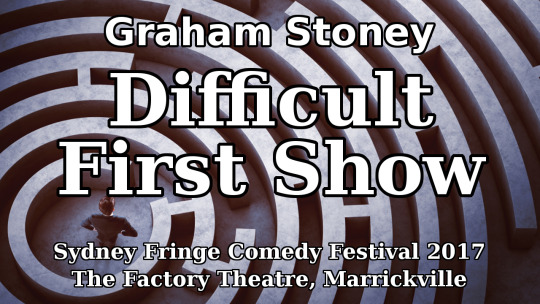
I spent the week before my Difficult First Show at the 2017 Sydney Fringe Comedy Festival curled up in a foetal position on my couch. It was right in the middle of music college holidays and I had been putting off finalising and rehearsing the show until this crucial break when I had no college work to do.
When I first submitted my application to the festival back in May, I figured I had plenty of time to get my act together. Come mid-September with just a week to go, for some bizarre reason I figured taking it easy was the way to go.
I had eleven songs I’d written for the show, mostly about experiences at college this year, which made up about 35-40 minutes of material. All I had to do was spin 20 minutes of stories between them and I should be sweet. How hard can it be?
Well, quite difficult it turns out.
Putting on my own show had brought up some pretty deep insecurities for me, like the old bullying I used to get when I was in the choir at my all-boys high school. After 30 years of therapy that was finally expunged at an Alexander Technique workshop I attended in the lead-up to the show. Surely the principals who run institutions that brutalise young men which we euphemistically call “Boys High Schools” should be hauled in front of some court in Nuremberg for their role in facilitating war crimes.
Nevertheless I had the academic transcript from successfully completing my Certificate 3 in Music Performance to boost my confidence, plus another marking me “Not Competent” due to an administrative error from the Group Choir Singing Intensive I’d taken over summer to tear it back down again.
I had had a traumatic experience playing a parody of American Pie at the now-defunct Laugh Garage opposite Hyde Park in Sydney about 4 years ago, and hadn’t played guitar in a comedy venue since. The first thing to do was get over that trauma, and since I wanted to talk about trauma and how to heal it in my show anyway, that seemed like the natural way to start.
To help take the pressure off I decided to play from my song book, which meant I didn’t have to memorise my own songs and could even remember the sequence of the show just by turning the page and seeing what song was next. All the stories about the songs were true and had been told in parts before, and they were largely just things that amused me. So long as an audience turned up and I focused on inviting them to join me in my own journey of amusement rather than trying to make them laugh or [intlink id=”2170″ type=”post”]make them like me[/intlink], everything should be OK.
I turned up to the first show with plenty of time to spare and spent the hour before my tech rehearsal sitting in the car down the road in sight of The Factory Theatre trying to remember how to breathe. Come rehearsal time I met the sound & lighting guy, gave him my MP3 player with the pre-recorded backing tracks for the show and started to calm the fuck down.
A couple of good friends turned up to see the first show and found me beforehand sitting outside the theatre near the bar. We had a hilarious chat and everyone was laughing even before the show began. That definitely helped put me in the right mood.
Then after years a delicate balance of preparation and procrastination, it was time to hit the stage for my Difficult First (solo) Show.
You won’t believe what happened next…
youtube
If you missed it, you’ll love the Difficult First Show I Didn’t Go Unisex T-Shirt.
#comedy#hyperbole#laughter#live#music#procrastination#success#Sydney Fringe Comedy Festival#Sydney Fringe Festival#Shows
0 notes
Text
Alexander Technique for the Voice | Alexander Technique Class
Sing, speak and act better with Alexander Technique
Alexander Technique (AT) can help you to find your own authentic voice. And with AT skills, you can keep your voice healthy and vibrant, throughout your performance, your career, and your life. Because AT lessons will improve your breathing, poise and freedom of expression, you will find yourself singing, speaking and acting with greater ease as you incorporated Alexander Technique into the way you support yourself, move and vocalize.
Thrill your audience before you make a sound
As critical as your sound may be, AT will help you create the precondition for that sound: the confidence you have in relationship with your Self. This is apparent in your physical presence, palpable to you, and visible to your audience, from the moment you walk on stage.
AT will help you achieve the readiness necessary to deliver an important artistic message in an expressive, inspiring way. This readiness emanates from the poise AT brings about in you, enabling you to move and communicate, from one moment to the next. Nothing extraneous, including stage fright, will get in your way, thanks to your AT skill.
Actors and singers rely on AT
Alexander Technique is part of the curriculum in nearly every professional conservatory worldwide, including Great Britain’s Royal Conservatory of Music and The Juilliard School in New York City. Actors and singers who study the technique learn to avoid the habits that impair breathing, pitch quality and timbre. For many great performers, AT is a “secret weapon.”
Get Complete Information : Best Alexander Technique Book
Contact Us : Click Here
0 notes
Text
"100 days. 100 hints on singing. No. 42.
“Tekubi," "ashikubi", "kubi," are a trio of our freedoms, neck, ankles, and wrists. Their linguistic commonality in Japanese speaks to their common function, conduits of freedom to our extremities, hand, head, and feet. If we cultivate their freedom we become better painters, better dancers, better singers, each part contributing to the whole and the whole to each part. That is certainly what F. M. Alexander saw in the head, neck, torso relationship, a facilitator of freedom throughout the torso, a tune to which ankles and wrists are counterpoint. Free your neck in order for the wrists and ankles to be free, free your ankles in order for the neck and wrists to be free, free your wrists in order for the ankles and neck to be free, your whole body an organ of singing. You’ll never find the all of it, but that part of it for today, begin it now. Waiting is not an option."
(Thanks to ATTallahassee for all the good stuff)
[via Alive On All Channels]
1 note
·
View note
Link
The Alexander Technique is an educational method for improving mental and physical wellbeing.
0 notes
Photo
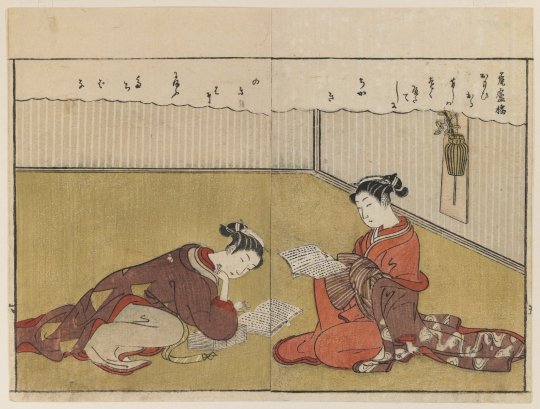
Closing out National Poetry Month, our Spring Interns paired some of their favorite poems with works from our collection. We hope you enjoy!
— Jeffrey Alexander Lopez, Curatorial Intern, American Art & Arts of the Americas
Image: Suzuki Harunobu (Japanese, 1724-1770). Page From Haru no Nishiki, 1771. Color woodblock print on paper. Brooklyn Museum, Gift of Peter P. Pessutti, 83.190.1

from Citizen: “Some years there exists a wanting to escape...” [Excerpt]
By Claudia Rankine
/
I they he she we you turn
only to discover
the encounter
to be alien to this place.
Wait.
The patience is in the living. Time opens out to you.
The opening, between you and you, occupied,
zoned for an encounter,
given the histories of you and you—
And always, who is this you?
The start of you, each day,
a presence already—
Hey you—
/
— Halle Smith, Digital Collections Intern
Catherine Green (American, born 1952). [Untitled] (West Indian Day Parade), 1991. Chromogenic photograph, sheet. Brooklyn Museum, Gift of the artist, 1991.58.2. © artist or artist's estate
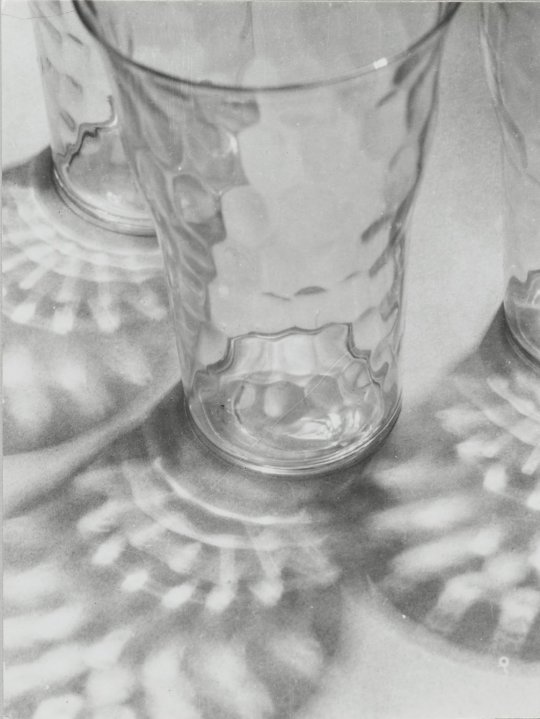
Ode to Enchanted Light
by Pablo Neruda
Under the trees light
has dropped from the top of the sky,
light
like a green
latticework of branches,
shining
on every leaf,
drifting down like clean
white sand.
A cicada sends
its sawing song
high into the empty air.
The world is
a glass overflowing
with water.
Consuelo Kanaga’s black and white photograph captures a dazzling, yet fleeting moment from everyday life. Three textured glasses cast shadows whose patterns are almost kaleidoscopic in effect. We can imagine Kanaga passing by her kitchen table, as she is brought to a halt to take a closer look at, and ultimately to photograph, the simple beauty generated by the play of light and everyday objects. The close-up scale of this image emulates the singularizing framing techniques deployed by Surrealist photographers, who also took parts of everyday life and blew them up in the photographic frame, thereby encouraging their viewers to look at life around us from a different angle. It is a way of saying: Here, take a closer look. Viewing the world with wonder, along with the joy that this act brings, are encapsulated in Pablo Neruda’s poem Ode to Enchanted Light. The speaker observes the way light passes through trees and creates enchanting patterns. He not only observes, but feels the beauty in the simple details of life, from the way light falls from the sky, to the sheen of leaves, to the buzzing of cicadas. Approaching life through such a hopeful lens evokes a glass-half-full perspective. In fact, the speaker is so hopeful that he believes “The world is/a glass overflowing/with water.” I think Kanaga would have felt the same way.
— Kirk Testa, Curatorial Intern, Photography
Consuelo Kanaga (American, 1894-1978). [Untitled] (Glasses and Reflections). Gelatin silver photograph. Brooklyn Museum, Gift of Wallace B. Putnam from the Estate of Consuelo Kanaga, 82.65.25
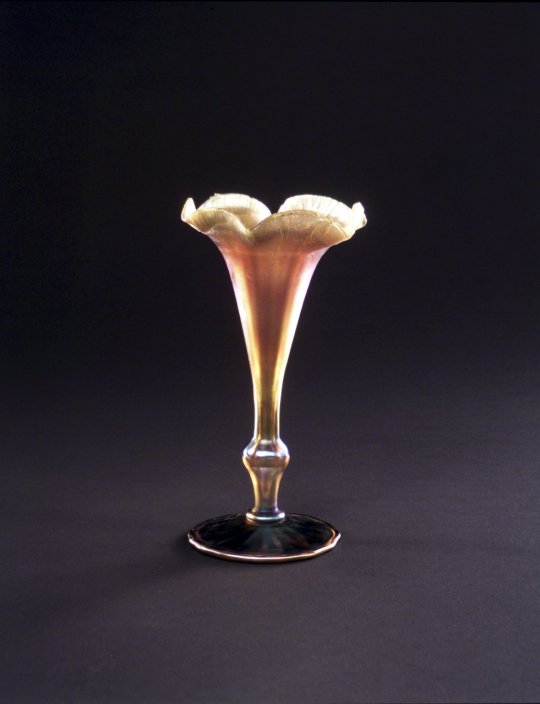
Easter Wings
By George Herbert
Lord, who createdst man in wealth and store,
Though foolishly he lost the same,
Decaying more and more,
Till he became
Most poore:
With thee
O let me rise
As larks, harmoniously,
And sing this day thy victories:
Then shall the fall further the flight in me.
My tender age in sorrow did beginne
And still with sicknesses and shame.
Thou didst so punish sinne,
That I became
Most thinne.
With thee
Let me combine,
And feel thy victorie:
For, if I imp my wing on thine,
Affliction shall advance the flight in me.
Easter Wings by George Herbet and Martin Bach’s flower vase from the Brooklyn Museum’s Decorative Arts collection reveal the interrelationship between form and function. In Easter Wings, Herbert strategically varies the line length to create an image that enhances the meaning of the poem; when you turn the poem on its side, it resembles the wings of a bird, of which are symbolic of the atonement of Jesus Christ. In doing so, the author is not only telling us his message, but he is showing it visually as well. Similarly, the vase takes the visual form of its function. Its floral design amplifies the meaning of the object, as the vase is meant to hold flowers. In both instances, we see how aesthetic properties of a work echo the meaning and function of the work itself.
— Amy Zavecz
Martin Bach (American, 1862-1921). Vase, ca. 1905. Opalescent glass. Brooklyn Museum, Gift of Mrs. Alfred Zoebisch, 59.143.16. Creative Commons-BY
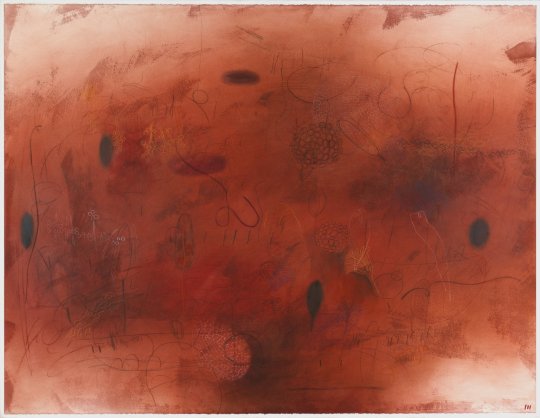
I am the Earth (Watashi wa chikyu) [Excerpt]
by Kiyoko Nagase, Translated by Takako Lento
I am warm, moist soil
I am a single supple stalk
I draw my life
all the way up into corollas of wild berries on the roadside
I am amazed at
a breast of water welling
to flow into the inlet of a muddy rice paddy
I am amazed at
myself being
hot steam blowing fire and sulfur up
from the bottom of the great ocean, deep indigo.
I am amazed at
the crimson blood flow
covering the earth’s surface in human shape;
I am amazed that it swells as the tides ebb and flow, and gushes out monthly under distant invisible gravity
…
I am the earth.
I live there, and I am the very same earth.
In the four billionth year
I have come to know
the eternal cold moon, my other self, my hetero being,
then, for the first time, I am amazed that I am warm mud.
The vivid imagery conjured up by Kiyoko Nagase’s poem is beautifully visualized by Emmi Whitehorse’s painting. The emphasis on deep Earth tones and abstract corporeality in both the poem and the painting really creates an intense metaphysical link between the environment and the self.
— Amanda Raquel Dorval, Archives Intern
Emmi Whitehorse (Navajo, born 1957). Fire Weed, 1998. Chalk, graphite, pastel and oil on paper mounted on canvas. Brooklyn Museum, Gift of Hinrich Peiper and Dorothee Peiper-Riegraf in honor of Emmi Whitehorse, 2006.49. © artist or artist's estate
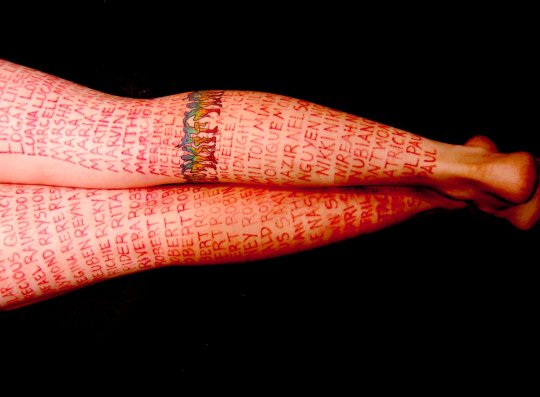
Seventh Circle of Earth
by Ocean Vuong
On April 27, 2011, a gay couple, Michael Humphrey and Clayton Capshaw, was murdered by immolation in their home in Dallas, Texas.
Dallas Voice
1
2
3
4
5
6
7
________________________________________________________
As if my finger, / tracing your collarbone / behind closed doors, / was enough / to erase myself. To forget / we built this house knowing / it won’t last. How / does anyone stop / regret / without cutting / off his hands? / Another torch
streams through / the kitchen window, / another errant dove. / It’s funny. I always knew / I’d be warmest beside / my man. / But don’t laugh. Understand me / when I say I burn best / when crowned / with your scent: that earth-sweat / & Old Spice I seek out each night / the days
refuse me. / Our faces blackening / in the photographs along the wall. / Don’t laugh. Just tell me the story / again, / of the sparrows who flew from falling Rome, / their blazed wings. / How ruin nested inside each thimbled throat / & made it sing
until the notes threaded to this / smoke rising / from your nostrils. Speak— / until your voice is nothing / but the crackle / of charred
bones. But don’t laugh / when these walls collapse / & only sparks / not sparrows / fly out. / When they come / to sift through these cinders—& pluck my tongue, / this fisted rose, / charcoaled & choked / from your gone
mouth. / Each black petal / blasted / with what’s left / of our laughter. / Laughter ashed / to air / to honey to baby / darling, / look. Look how happy we are / to be no one / & still
American.
Ocean Vuong’s “Seventh Circle of Earth” has persisted as one of the great, affective moments of poetry in my life since I first heard Pádraig Ó Toama’s gorgeous reading and discussion of it on his podcast, Poetry Unbound. I decided to pair Vuong’s poem with Mary Coble’s Untitled 2 (from Note To Self) because both works are urgently immersive into the violence and experience of LGBTQ people in the U.S., and for how each work uses text and physicality to address presence, pain, and erasure. Vuong’s poem is actually footnoted to a quote from a news article about a gay couple murdered in Texas. The page is thus blank, absent of text. The reader has to sink below the main stage, the accepted space of word and story, to find the voices of this couple and the depth of their story’s tenderness, eroticism, and utter devastation. Coble’s piece foils the structure and effect of Seventh Circle of Earth by taking what was subverted by Vuong—text and the narrative of violence—wholly to the surface. Her photograph captures her own legs tattooed without ink with the names of LGBTQ individuals victimized by hate crimes. I cannot help but think of Franz Kafka’s short story “In the Penal Colony,” in which prisoners’ “sentences'' are inscribed by the needle of a “punishment apparatus” directly onto their bodies. I was struck by how the curator’s note for this photograph describes Coble’s artistic endeavor here as “harrowing.” The needle in Kafka’s short story is indeed called “The Harrow”. The noun harrow is an agricultural tool that combs plowed soil to break up clumps of earth and uproot weeds and clear imperfections. The verb to harrow means to plague, and in the story’s original German the verb for “harrow”, eggen, is also translated as “to torment”. Kafka and Coble conflate these definitions of “the harrow” in their respective works: they use a needled device, like the true noun definition, as an instrument of torment because of someone else’s idea of punishment and justice. Here, violence is brought to the surface, intimate in as much as we are brought right up to the artist’s skin and into the presence of her and her community’s pain. Together, one can see how each creator physicalizes their respective artistic space to tell the stories of LGBTQ people, of what is tender and harrowing, below the surface and written into the skin.
— Talia Abrahams, Provenance Intern, IHCPP
Mary Coble (American, born 1978). Untitled 2 (from Note to Self), 2005. Inkjet print. Brooklyn Museum, Gift of the artist, 2008.10. © artist or artist's estate
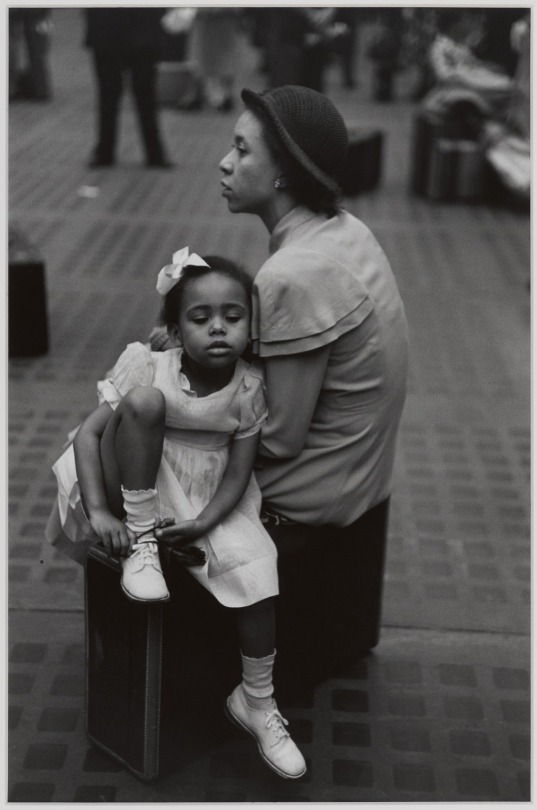
To my daughter Kakuya
by Assata Shakur
I have shabby dreams for you
of some vague freedom
I have never known.
Baby
I don't want you hungry or thirsty
or out in the cold.
and I don't want the frost
to kill your fruit
before it ripens.
I can see a sunny place
Life exploding green.
I can see your bright, bronze skin at ease with all the flowers
and the centipedes.
I can hear laughter,
not grown from ridicule
And words not prompted
by ego or greed or jealousy.
I see a world where hatred
has been replaced by love.
and ME replaced by WE
And I can see a world replaced
where you,
building and exploring,
strong and fulfilled,
will understand.
And go beyond
my little shabby dreams.
This poem is featured in Assata Shakur’s memoir, Assata: An Autobiography. It details her hope for a better world that her daughter can grow up in. This poem is positioned in the book when Shakur is facing increasing prosecution as a result of her activism and affiliations with the Black Panther Party and Black Liberation army. Being written more than 30 years after this picture was taken, the poem summons me to think about the trauma that many Black women face and how much of that trauma gets passed down to their children. The black and white photo of a mother and daughter provides a nice visual to the poem. “The image of a Black mother and child sitting on their luggage reflects the little-discussed history of segregated transportation in the northern United States. Through the 1940s, Penn Station officials assigned Black travelers seats in Jim Crow cars on southbound trains” (Brooklyn Museum). The photograph of train passengers waiting outside of Manhattan’s Pennsylvania Station especially echoes the verse “I don’t want you hungry or thirsty or out in the cold.” The overall optimistic tone of Shakur’s poem alters our relationship to the image as we imagine the mother pictured above hoping for the exact same things
— Zaria W, Teen Programs intern
Ruth Orkin (American, 1921-1985). Mother and Daughter at Penn Station, NYC, 1948. Gelatin silver photograph, sheet: 13 15/16 × 11 in. (35.4 × 27.9 cm). Brooklyn Museum, Gift of Mary Engel, 2011.22.3. © artist or artist's estate
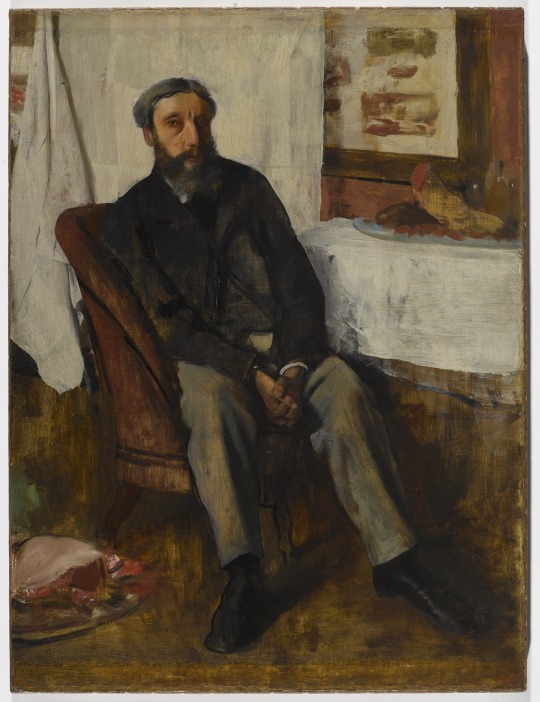
Crunch.
By Kailyn Gibson
I retch as a mass of sinew lies between my lips.
The sensation is unbearable.
Fortunately, the jar of flies has gone missing again.
Slowly, surely, and yet never sure at all,
the quiet of buzzing rings through the in-between.
It is a symphony wrought from blood and bone.
Saliva drips from bleeding, hungry gums,
And the crunch of glass echoes the grinding of molars.
If I proffered a sanguine smile, would masticated shards look like teeth?
Would they gleam just as prettily?
The flies ring,
and the rot calls.
— Kailyn Gibson
Edgar Degas (French, 1834-1917). Portrait of a Man (Portrait d'homme), ca. 1866. Oil on canvas. Brooklyn Museum, Museum Collection Fund, 21.112
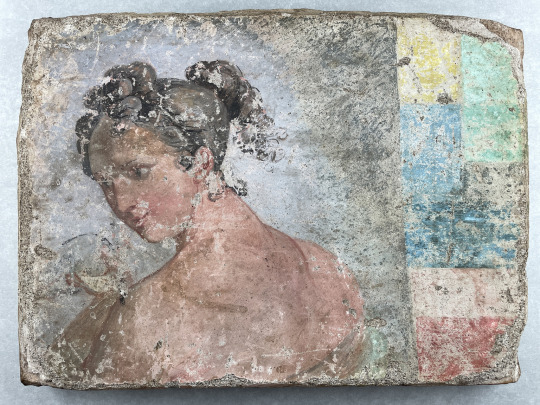
Excerpt from Autobiography of Red
A novel in verse by Anne Carson
7. If Helen’s reasons arose out of some remark Stesichoros made either it was a strong remark about Helen’s sexual misconduct (not to say its unsavory aftermath the Fall of Troy) or it was not.
8. If it was a strong remark about Helen’s sexual misconduct (not to say its unsavory aftermath the Fall of Troy) either this remark was a lie or it was not.
9. If it was not a lie either we are now in reverse and by continuing to reason in this way we are likely to arrive back at the beginning of the question of the blinding of Stesichoros or we are not.
10. If we are now in reverse and by continuing to reason in this way are likely to arrive back at the beginning of the question of the blinding of Stesichoros either we will go along without incident or we will meet Stesichoros on our way back.
11. If we meet Stesichoros on our way back either we will keep quiet or we will look him in the eye and ask him what he thinks of Helen.
12. If we look Stesichoros in the eye and ask him what he thinks of Helen either he will tell the truth or he will lie.
13. If Stesichoros lies either we will know at once that he is lying or we will be fooled because now that we are in reverse the whole landscape looks inside out.
This excerpt comes from Appendix C of Anne Carson’s Autobiography of Red, a novel in verse. A translator and classicist herself, Carson mixes fact with fiction in her unconventional retelling of the myth of Geryon and Hercules, beginning with a roundabout introduction to the poet Stesichoros. Autobiography presents a captivating example of recent Queer projects that take up Classical material as their basis. A fascination with the Classical past has pervaded our modern conception of sexual identity politics, down to the very etymology of the word “lesbian.” In this fascination, I see the same desire to capture Classical imagery as cultural heritage which has also pervaded American museums, albeit with significantly different aims. The fresco pictured above comes to mind, which passed through many collectors and was even purchased by the museum before anyone pegged it as a modern piece—not an original Roman fresco. John D. Cooney, a 20th century curator of our Egyptian, Classical, and Ancient Near Eastern Art collection, wrote that “the unclad and somewhat winsome charms of the lady [probably] diverted objective glances.” Both in the case of the fresco and Carson’s novel, the “unclad and somewhat winsome charms” of the Classical past shape and reshape our understanding of history.
— Kira Houston, Curatorial Intern, Egyptian, Classical, and Ancient Near Eastern Art
Modern, in the style of the Roman Period. Part of a Fresco, early 19th century C.E. Clay, paint. Brooklyn Museum, Ella C. Woodward Memorial Fund, 11.30.
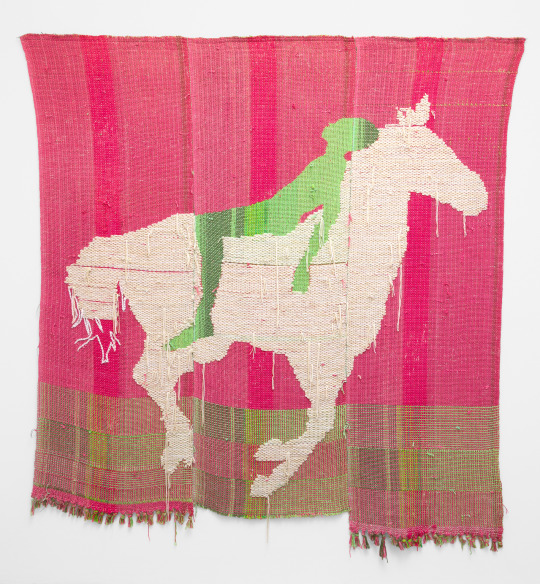
Late Fragment
by Raymond Carver From A New Path to the Waterfall,
Atlantic Monthly Press, 1989.
And did you get what
you wanted from this life, even so?
I did.
And what did you want?
To call myself beloved, to feel myself
beloved on the earth.
— Shori
Diedrick Brackens (American, born 1989). when no softness came, 2019. Cotton and acrylic yarn. Brooklyn Museum, Purchased with funds given by The LIFEWTR Fund at Frieze New York 2019, 2019.12. © artist or artist's estate
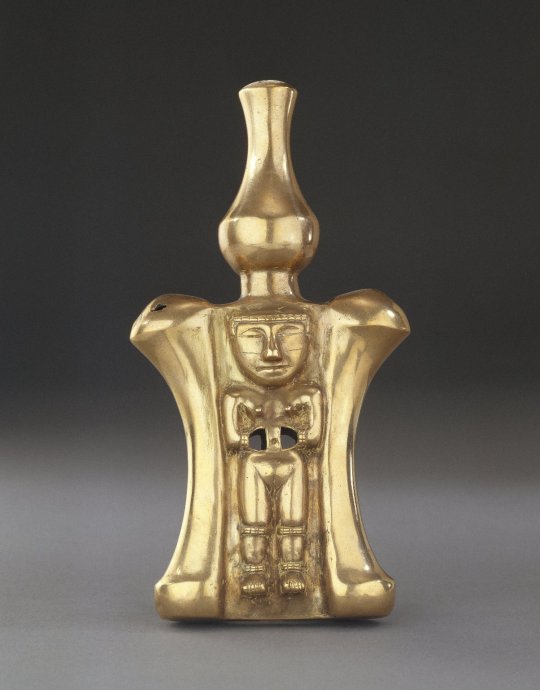
Jaguar
By Francisco X. Alarcón
some say dicen que ahora
I'm now almost estoy casi extinto
extinct in this park por este parque
but the people pero la gente
who say this que dice esto
don't know no sabe
that by smelling que al oler
the orchids las orquídeas
in the trees en los árboles
they're sensing están percibiendo
the fragrance la fragancia
of my chops de mis fauces
that by hearing que al oír
the rumblingc el retumbo
of the waterfalls de los saltos
they're listening están escuchando
to my ancestors' el gran rugido
great roar de mis ancestros
that by observing que al observar
the constellations las constelanciones
of the night sky del firmamento
they're gazing están mirando
at the star spots las motas de estrellas
on my fur marcadas en mi piel
that I am and que yo soy
always will be y siempre seré
the wild el indomable
untamed espíritu silvestre
living spirit vivo de esta
of this jungle jungla
While the author of the poem speaks about animals, their words can also speak on behalf of the erasure of indigenous peoples in South America. Much like the jaguar, indigenous traditions and culture are very important to life in South America. Despite their marginalization, Indigenous peoples throughout the Andes used coca leaves to help with the altitude. The use and cultivation of coca are criminalized throughout most of South America despite it being essential to indigenous cultures. This vessel was used to contain lime which would activate the coca leaves. Much like the jaguar, indigenous traditions are also faced with endangerment despite being woven into the fabric that is Latin America. Through the opposite man and woman figures, the vessel shows the duality that is important to the Quimbaya people which is still relevant to Colombians today.
Aunque el autor del poema habla sobre los animales, sus palabras también comunican el sentimiento común de la supresión de los indígenas en Suramérica. Con la mención del jaguar, se puede entender en el poema que la cultura y las tradiciones de las personas que son indígenas son sumamente importantes para la vida en Sudamérica. A pesar de su marginación, los indígenas en Los Andes utilizan la hoja de coca para ayudar en la altura de las montañas. El uso y el cultivo de la hoja de coca fue criminalizado (penalizado) a través de Sudamérica, aunque su uso para los indígenas era vital y esencial para su cultura. Este recipiente que se utiliza contiene limón lo que activa la hoja de la coca. Similarmente al jaguar, las tradiciones de los indígenas siempre estaban en peligro aunque estuvieran entrelazadas en las telas de lo que sería Latinoamérica. A través del hombre opuesto y las figuras de mujeres, el recipiente muestra la dualidad de lo que es importante para las personas que son Quimbaya, algo que todavía hoy es relevante para los Colombianos.
— Jeffrey Alexander Lopez, Curatorial Intern, American Art & Arts of the Americas
Quimbaya. Poporo (Lime Container), 1-600 C.E. Tumbaga. Brooklyn Museum, Alfred W. Jenkins Fund, 35.507. Creative Commons-BY
115 notes
·
View notes
Text
Cupid Parasite
Series

Weekend at Catskill
Raul needs some help with another high-profile stalker and enlists his friend’s help, but Lynette is more than just a little uncomfortable with the whole situation.

Cancelled Plans
Shelby and Lynette have plans for the evening, but he blows her off because of work. Again.
One-Shots

A Sudden Change in Opinion
The reason why Shelby suddenly decides he wants to formally get married, after all.

On The Shadow of a Basileus
What has been unchained, cannot be hidden again. Raul and Alexander are forced to share the same corporeal existence, and Lynette learns how to deal with it.

After Crying on the Catwalk
Lynette returns to Los York after a long stay in Europe. A love from her past appears before her on her first night in the city.

Silly Faces Contest
Lynette and Raul are waiting nervously for results. He tries to get their mind off of things with a technique he uses with the child actors he works with.

A Goddess’ Growing Pains
Cupid has to deal with her first broken match. Fortunately for her, she can lean on the help of the Lord God.

First Experiences with the Flu
Lynette catches a cold for the first time in five hundred years of existence, and she is not dealing well. It falls upon her husband to make her feel better.

When They Are Apart
Different types of love rarely manage to understand each other and find common ground. Raul and Lynette experience that closely.

President’s Early Day
Shelby comes back home early from work, sick with the flu. Lynette waits for him on the couch with primetime television.

Awards Night
Raul wins an Academy Award for Best Actor and drinks himself to oblivion to celebrate. Lynette has to take him back home.

Birthday Dread
Shelby does not want to celebrate his birthday this year. His girlfriend is not about to let that stand.

Naïve Men, Hung on a Fire Escape
Lynette cannot sleep with the thoughts of her broken heart racing through her mind. The object of her forlorn love climbs up her fire escape.

Nesting Break
Lynette and Raul are working on their first-born’s nursery, when it comes time for a break.

The Chris Chrime in His Head
Shelby feels insecure about his image when he watches his girlfriend get ready for a party. She reassures him the best way she knows how.

Crab Cakes, Off Time and Mature Relationships
Lynette has perfected her crab cake recipe as a way to support her husband’s busy schedule. It almost never end in disaster anymore. Almost.

Pudgy Action Star
After a strongly-worded rejection at a casting call, Raul is feeling insecure about his weight. His wife is there to make him feel better, and to make him eat a chocolate cookie.

Fruit Salad and Condensed Milk
Shelby is devolving into old habits and forgets to eat. Lynette prepares him a fruit salad instead.

A Lovecraft Breakfast in Bed
Lynette decides to cook breakfast in bed for her husband, just because.

Boring, Boring Golf
Shelby takes his contrarian girlfriend to play golf one weekend. She does not focus on the game.

Obcessive Nesting
When Lynette is seven months pregnant, Raul focus his single-minded and boundless energy in another activity: buying things for their unborn son.

Sleep-Watching Hobbyist
Shelby enjoys spending his time contemplating at the relaxing beauty of his wife when she is asleep.

Song of the Caged Bird (Our Mar. 6th, 07:00 PM SAST)
Cupid has only one thing for herself in her prison, her singing. Her captor takes that away, too.
12 notes
·
View notes
Text
I’ve had many private conversations about Louis’ singing voice and his live performances. Being a musician, I’m not blind to his faults, though I love him and his voice dearly, I love his tone, his passion, the empathy he can project. I don’t love his pitch or breath control. But what has baffled me about this the last few years is that, though he’s improved, his younger, early 1D voice seemed more flawless. Think “Valerie.” Think those harmonies the boys did live... fucking brilliant. And yes it’s a different animal to go solo, and he smokes now, but. BUT. Voices come into maturation at Louis’ present age, and his should have improved way more than it has, especially with a devoted voice coach and ample time. My first thought, and it’s partly true I believe, is that stress and grief have contributed to a lot of tension in him. You see your whole body vibrates when you sing, and if you’re tight, it’s like plucking a rubber band stretched too taut: it won’t vibrate. Also your diaphragm needs to be malleable. Your posture grounded but not stiff. And as I’m going through this mental checklist of all the Alexander technique classes I’ve been through as a musician, all the times a SINGLE muscle being tight hindered my technique in a massive way, I finally realized. Louis’ tension problems started when he was no longer allowed to move flamboyantly. When they stifled the easy fluidity with which he moved on stage; his graceful arms, his swaying hips. When the boy from Grease, from club GAY, was made to stride instead of prance, to hand gesture and point instead of bend his wrists. You have no idea the incredible tension that comes with going against your natural performance instincts. How holding your hips unnaturally sends a whole ridigity through your spine, to your neck... how that tension translates to your shoulders, and to your vocal chords. Anyways I’m just... I’m just mad. Because it’s so obvious, it’s been there from the start and I just never NOTICED before that he holds so much tension in his performance movements, the choreography he’s allowed to present. He’s not free to prance around, or to move instinctively, or naturally... he’s not free.
552 notes
·
View notes